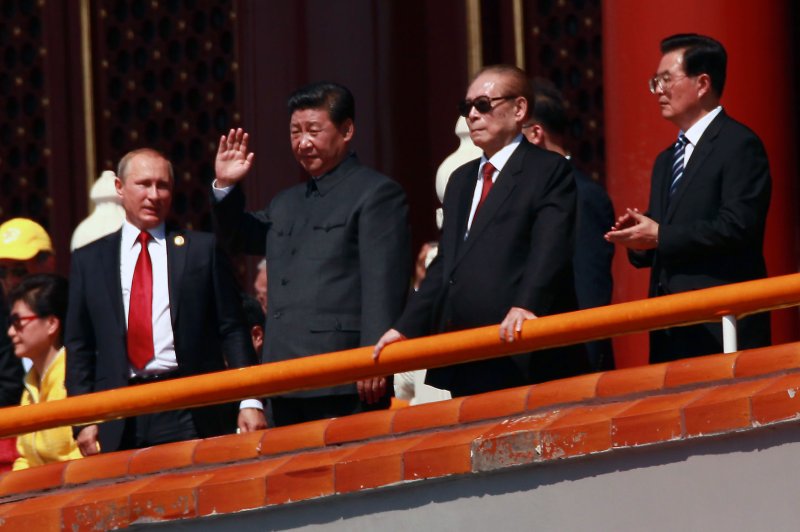Left to right, Russian President Vladimir Putin, Chinese President Xi Jinping, former Chinese Presidents Jiang Zemin and Hu Jintao preside over a parade marking the 70th anniversary of victory over Japan held in September. On far left, South Korean President Park Geun-hye observes the parade. Park and Xi had agreed to work toward denuclearization on the Korean peninsula, but China is not responding to a call from South Korea. File Photo by Stephen Shaver/UPI |
License Photo
SEOUL, Jan. 8 (UPI) -- A recently established military hotline between South Korea and China isn't working in the wake of North Korea's fourth nuclear test claim.
The line, inaugurated to set new standards for security cooperation between Seoul and Beijing, is not functioning properly, South Korean newspaper Munhwa Ilbo reported.
The operation failure comes at a time in Seoul when the administration of South Korean President Park Geun-hye has touted an unprecedented era of favorable China-South Korea relations.
North Korea's announcement Wednesday that it had successfully tested a hydrogen bomb, however, is testing new uncharted waters in bilateral ties.
China is North Korea's closest economic partner and traditional ally. During the 1950-53 Korean War, Chinese leader Mao Zedong dispatched hundreds of thousands of Chinese troops to aid North Koreans against U.S. and South Korea forces.
The hotline was established so Seoul and Beijing military officials could coordinate efforts following a crisis.
A South Korean Defense Ministry official said Seoul requested communication but Beijing did not respond.
Defense Minister Han Min-koo said China is watching the North Korean nuclear test and is taking a wait-and-see approach rather than communicating issues with South Korea.
A scheduled phone call between South Korean Foreign Minister Yun byung-se and his Chinese counterpart Wang Yi also did not go as planned, although Wang and U.S. Secretary of State John Kerry spoke after North Korea's H-bomb announcement.
Yun also had exchanged calls with Kerry and Japanese Foreign Minister Fumio Kishida.
Chinese President Xi Jinping also is refraining from contact with foreign leaders.
Yonhap reported Xi did not issue any statements condemning the claims of a hydrogen bomb test, despite signing a joint statement with Park in September, urging for denuclearization on the peninsula.
The New York Times reported Kerry admonished the Chinese leadership and its failure to keep a tighter grip on North Korea.
"China had a particular approach that it wanted to make, and we agreed and respected to give them space to be able to implement that," Kerry said. "Today in my conversation with the Chinese I made it clear: That has not worked, and we cannot continue business as usual."















